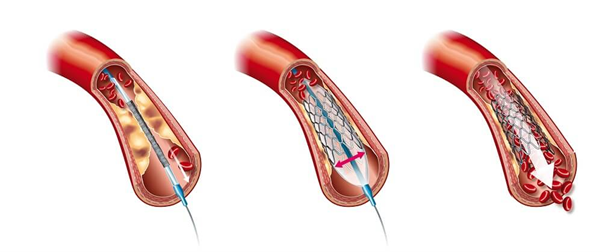Percutaneous Coronary Intervention (PCI) is a procedure used to treat blocked/ narrowed coronary arteries, which supply blood to your heart. This procedure helps improve blood flow to your heart, which is essential for preventing heart attacks and relieving symptoms like chest pain.
If you’re considering PCI, here are answers to some common questions that can help you understand the procedure better.
- What is PCI?
PCI is a minimally invasive procedure to open up blocked or narrowed arteries in your heart. A small catheter is inserted through a blood vessel, usually in your groin or wrist, and guided to the blocked artery. A balloon is then inflated to open the blockage, and often a small metal mesh tube (stent) is placed to keep the artery open.
- Why is PCI Needed?
PCI is typically used to treat coronary artery disease (CAD), where fatty deposits build up in the arteries and reduce blood flow to the heart. This can lead to chest pain (angina) and elevate the risk of a heart attack.
PCI is recommended if lifestyle changes or medications haven’t helped and if the blockage is affecting your quality of life or heart health.
- What is a Stent?
A stent is a small mesh tube that’s inserted into the artery to help keep it open. It prevents the artery from narrowing again and ensures that blood can flow freely. Some stents are coated with medication that helps reduce the chances of the artery becoming blocked again.
- How Long Does PCI Take?
The procedure usually lasts between 30 minutes and 2 hours, depending on the complexity of your case. Afterwards, you will be monitored for a few hours in the hospital. Most people are able to go home the same day or the next day.
- What Happens After PCI?
After PCI, most people feel relief from chest pain or other symptoms. You will be monitored in the hospital for a few hours, and then you can go home. Most people can return to normal activities within a few days, but you should avoid heavy exercise or lifting for a short time.
- How Effective is PCI?
PCI is highly effective for improving blood flow and relieving symptoms like chest pain. It also reduces the risk of heart attacks in many patients. However, it’s important to note that PCI doesn’t cure coronary artery disease. You will need to follow a heart-healthy lifestyle and take any prescribed medications to keep your heart healthy.
- Will I Need to Make Lifestyle Changes After PCI?
Yes, lifestyle changes are crucial after PCI. You will likely be advised to eat a heart-healthy diet, exercise regularly, quit smoking, manage stress, and take any prescribed medications. These changes can help prevent further blockages and improve your overall heart health.
Percutaneous Coronary Intervention (PCI) is a safe and effective procedure for treating blocked or narrowed arteries in the heart. It can help reduce symptoms such as chest pain and enhance blood circulation to the heart. If you have coronary artery disease, PCI may be a key part of your treatment plan.
Talk to your doctor to understand if PCI is right for you and how you can take care of your heart health moving forward!

